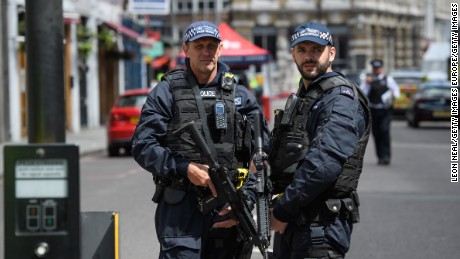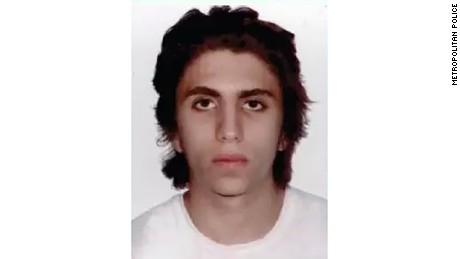What we know about the London Bridge attackers
Updated 1508 GMT (2308 HKT) June 6, 2017
London (CNN)British authorities have now identified all three men behind Saturday night's rampage at London Bridge -- and are investigating whether others were involved.
At least seven people were killed and another 48 people were wounded in the attack.
Within eight minutes of the first emergency phone call, officers shot dead all three suspects in Borough Market, a popular restaurant and bar district nearby.
This is what we know about the attackers so far.
Khuram Shazad Butt, 27
-- Butt was a British citizen who was born in Pakistan, London's Metropolitan Police said. Police and MI5 -- the UK's security and counterintelligence agency -- were familiar with him, but there was no intelligence to suggest the weekend attack was being planned, Met Police said.
-- Authorities said Butt was from the east London area of Barking. He was working at reception of a local fitness center.
-- Butt appeared in a 2016 documentary called "The Jihadis Next Door," which told the story of Abu Rumaysah, the Londoner who has appeared in recent ISIS propaganda.
-- Butt, who also used the name Abdul Zaitun, is believed to have associated with the outlawed radical Islamist group al-Muhajiroun, co-founded by notorious hate preacher Anjem Choudary.
-- Al-Muhajiroun has been linked to the radicalization of a number of UK-based terrorists over the years including several of those behind a fertilizer bomb plot thwarted in the UK in 2014.
-- CNN's Sandi Sidhu met Butt several years ago while reporting in London. She said that while he would attend meetings, he rarely spoke up and was not at the helm of the group.
-- Al-Muhajiroun has also been linked to Michael Adebolajo, one of the men convicted of slaying British soldier Lee Rigby near a military barracks in southeast London in 2013.
-- Mohammed Shafiq, chief executive of the Ramadhan Foundation, said Butt verbally assaulted him the day after Rigby's death. "Butt called me a "Murtad" which means traitor in Arabic and accused me of being a government stooge when I confronted Anjem Choudhury about him supporting terrorism and my public campaign against Lee Rigby's murder," Shafiq said in a statement Monday.
London Bridge terror attacks
-- Butt "infrequently" attended Jabir bin Zayd Islamic Centre in Barking, that mosque said in a statement. "We did not know him well, his name was not known to us, it has been brought to our attention that some years ago after interrupting a Friday sermon he was asked to leave the mosque," the statement said.
-- Neighbors in Barking told CNN that they had recognized Butt as one of the three dead attackers from Saturday night. They described him as a quiet family man who kept to himself.
-- Barking resident Erica Gasperri said she had reported Butt to police after she saw him teaching local children about Islam and showing them how to pray.
-- Other neighbors have told CNN that Butt had joined a mosque nearby after he severed ties with another community following an argument.
-- Butt briefly worked for Transport for London, the entity that oversees the city's public transport system. He was a trainee customer services assistant with London Underground for less than six months, before leaving in October, according to a Transport for London spokesperson.
Rachid Redouane, 30
-- Redouane also used the name Rachid Elkhdar
-- He had claimed to be Moroccan and Libyan, Met Police said.
-- Like Butt, Redouane lived in the east London area of Barking, police said.
-- Unlike Butt, Redouane was not previously known to authorities.
Youssef Zaghba, 22
-- Like the other two perpetrators, Zaghba lived in east London, Met Police said.
-- He is believed to be an Italian national of Moroccan descent and was not a subject of police or intelligence interest, police added.
-- Italian police tell CNN Zaghba became a person of interest after he was stopped at Bologna Airport in March 2016 on suspicion of attempting to travel to Syria. Zaghba -- traveling on an Italian passport -- had tried to board a flight bound for Istanbul. Police also found extremist material on his cellphone. He was stopped from departing Italy but there was insufficient evidence to arrest him so authorities filed a report and placed on a watchlist.
What we don't know
-- The Ireland connection. A source briefed by an Irish counterterrorism official told CNN that one of the London attackers had a connection to Ireland after state media reports that an Irish ID card was found on the body of one of the London attackers. But it's not clear which attacker may have had the Irish ID. Irish authorities are assisting the Metropolitan Police in their investigation but refused to comment further.
-- What could have been done to prevent this attack. Questions are being leveled at UK security and intelligence services about the possible lack of response or action given that at least one attacker -- Butt -- was well-known to authorities due to his links to al-Muhajiroun and reports of his radicalization. Authorities had investigated Butt in 2015 but there were no indications of an imminent attack and the probe was downgraded.
-- How these men knew each other.
-- Whether others are involved. Raids continue in east London and Pakistan on Tuesday, with detectives arresting a man at an address in Barking. Twelve others arrested after the attack have since been released without charge, police said.
-- What their movements were before the attack.
-- How they were radicalized. In the attack's aftermath, British Prime Minister May identified the Internet as a breeding ground of extremism. Whether the web actually played a role in the attackers' radicalization is still unknown.










